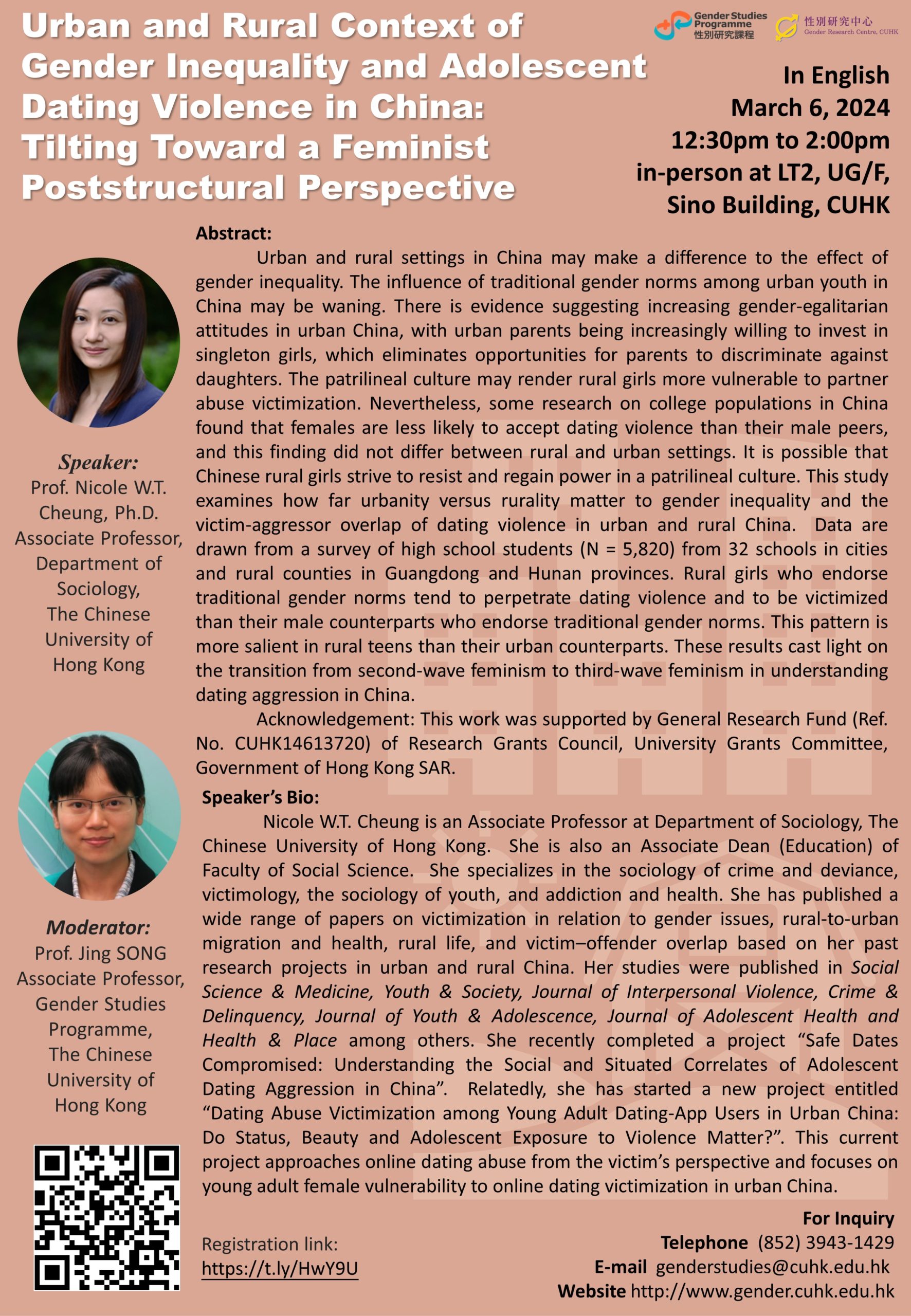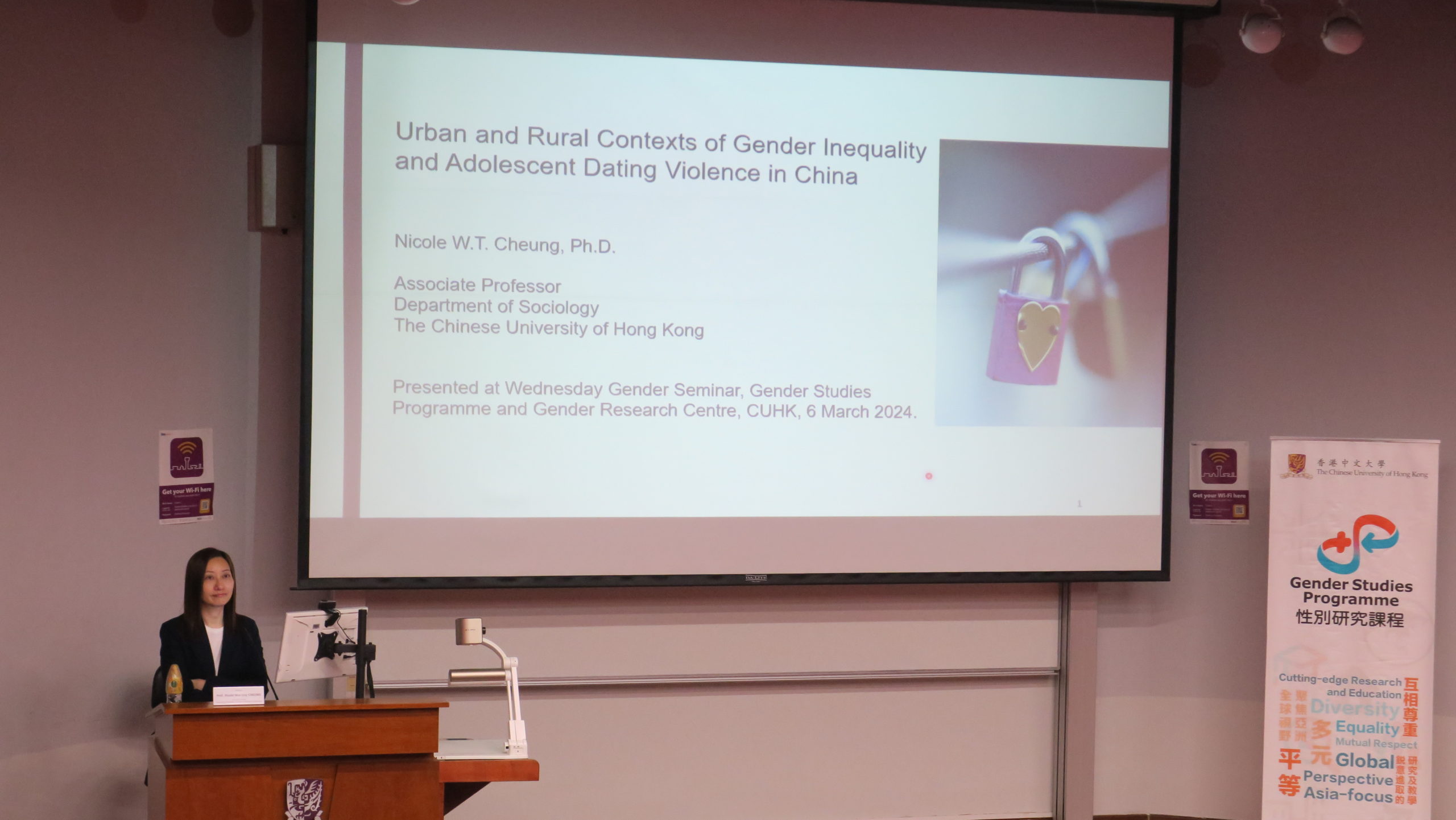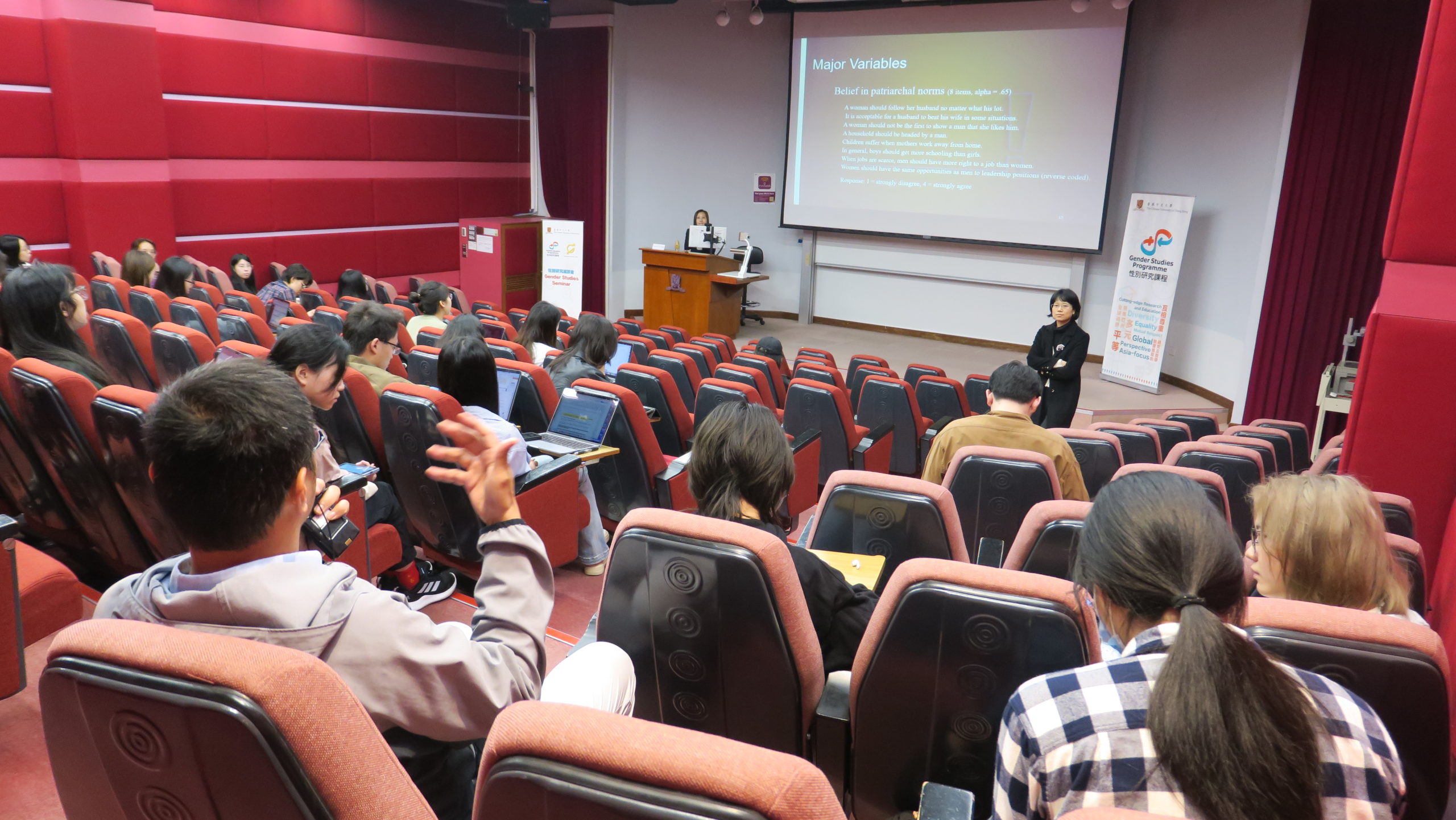The theme of the seminar is ‘Urban and Rural Contexts of Gender Inequality and Adolescent Dating Violence in China’. Professor Cheung focused on adolescent health from a feminist post-structural perspective, she noticed that both teen dating boys and girls may be equally involved in perpetration and victimization. Based on the background of research on adolescent dating violence in overseas and China, Cheung examined the role of gender inequality in adolescent dating violence and how urban and rural contexts make a difference in this progress. Firstly, Cheung reviewed the relationship between the two waves of feminism and gender inequality, which showed that since second-wave feminism focused on how men dominate women, dating violence can be seen as a form of its expression that scholars could use as a starting point for research. However, in order to examine why young women became the perpetrators of dating violence, it is necessary to bring in third-wave feminism to understand the contradiction between young women and patriarchy. Meanwhile, Cheung also noted that urban-rural contextual differences may lead to changes in the identities of males and females as perpetrators or victims of dating violence. Based on these theoretical frameworks, Cheung used quantitative research to investigate 32 high schools in cities and rural countries in Guangdong and Hunan provinces. By analyzing the data sample, Cheung found that girls were more likely to perpetrate dating violence than boys in both urban and rural areas, but girls were also more likely to be victims than boys, especially in rural China. While adherence to patriarchal norms is more likely to increase the odds of dating violence perpetration among boys and the odds of victimization among rural boys. This is because patrilineal culture, as interpreted by second-wave feminism, is still prevalent in both urban and rural China, but rural girls, under the influence of third-wave feminism, were trying to resist and regain power in a patrilineal culture by resorting to aggression in response.
撰文:LI, Zhixin
On 6 Mar 2024, Wednesday Gender Seminar invited Professor Nicole W.T. Cheung to share her research, Urban and Rural Contexts of Gender Inequality and Adolescent Dating Violence in China.
Although dating violence, intimate partner violence, is an academic staple, existing studies exclusively focus on adults and the Western contexts. There are very few studies that care about teenagers, yet such violence can emerge among teenagers. Besides, international studies on the prevalence rates of adolescent dating aggression suggest there is no significant gender difference in being abused. Contextualizing in China, even though the comparable overall rates to the international level, boys are more likely to both perpetrate and be victimized by physical violence. However, rural-urban regional differences are still omitted, and we know little about rural contexts. Prof. Cheung, thus, proposed the research agenda about gender inequality and rural-urban regional differences in Chinese adolescent dating violence. This topic could provide some understanding of why and how teens establish intimate relationships and show the life course perspective and meanings of marriage.
Adopted quantitative research methods, Prof. Cheung surveyed 32 high schools in cities and rural counties between Sep 2021 and May 2022, covering 5,820 teenagers (2,835 from urban regions and 2,935 from rural countries). She finds that, in terms of overall gender difference, girls are more likely to perpetration, while boys, especially in rural China, tend to be victimized. After intersecting the belief in patriarchal norms with regional contexts, gender and regional differences emerge. Generally, the belief in patriarchal norms tends to increase boys’ dating violence perpetration across rural and urban settings, while there is no significant influence on girls. However, rural boys with the belief in patriarchal norms are more likely to be victimized than rural girls. And it is not salient in the urban contexts.
Patriarchal culture is key to these findings. In rural areas, the dominant patriarchal cultures contribute to boys’ higher possibility of using violence in relationships. Rural girls, however, are increasingly unsatisfied with patriarchy and imbalanced power dynamics, which leads to their aggressive responses to rural males and victimizing rural boys when dating. She concluded that third-wave feminism is more relevant to rural contexts rather than urban ones.
撰文:LIU, Danchen
Nicole W.T. Cheung教授分享了她对中国城乡地区性别不平等和青少年约会暴力问题的研究。青少年约会暴力不仅发生在成年伴侣之间,也在青少年群体中普遍存在。国际研究表明,全球范围内青少年约会暴力发生率约为19%,其中包括身体暴力和性暴力。男性和女性在实施和遭受身体暴力方面的比例相当,而男性更容易实施性暴力。在中国,青少年约会暴力的总体发生率与国际水平相当。
此研究关注了两个方面的问题:一是性别不平等在中国青少年约会暴力中的作用是什么?二是城市和农村环境对性别不平等对青少年约会暴力的影响有何差异?
第二波女权主义和第三波女权主义对性别不平等的作用有所不同,这也影响了青少年约会暴力问题的解释。第二波女权主义强调了父权制和男性社会建构的作用,表现为男孩对女孩施加权力和控制。第三波女权主义关注与性别相关的权力和控制问题,解释了为什么年轻女性会通过约会暴力来反抗父权制性别规范和恋爱关系中的权力不平衡。
城市和农村环境对青少年约会暴力有不同的影响。在中国城市中,性别平等观念逐渐增强,城市女孩更多地表现为幸存者而不是受害者。然而,在中国农村地区,由于经济限制和对儿子的偏重,女孩面临着不公平的资源分配,使其更容易成为约会暴力的受害者。但是,对中国大学生的研究发现,女生比男生更不容易接受约会暴力,这一发现在农村和城市环境中并无差异。
基于上述背景和假设,Cheung教授进行了进行两个方面的假设:一是,基于第二波女性主义,对父权制性别规范的信仰会助长男孩约会暴力的实施和女孩约会暴力的受害。二是,基于第三波女性主义,父权制性别规范的信仰会助长不同性别间的约会暴力,并使男孩成为约会暴力的受害者。研究并采用将两个阶段分层集群抽样调查的方法,调查涵盖了广东和湖南两个省份的城市和农村高中学生。主要变量包括控制行为、心理虐待、恐吓、身体虐待、性骚扰和对父权规范的信仰。
最终,研究数据结果显示,在中国的城市和农村地区,女孩更容易实施约会暴力,尤其在农村地区女孩遭受约会暴力的几率更高。所有地区中相信父权制规范的男孩更可能实施约会暴力,增加了男孩在约会关系中对女孩施暴的可能。第三波女权主义与农村背景相关,农村女孩更不满意权力平衡,并通过攻击行为来抗议和重新获得权力,使约会男性成为受害者。
撰文:LIU, Moxuan
本次講座深入探討了中國青少年約會暴力的問題,特別關注了城鄉背景下性別不平等與約會暴力之間的複雜關係。研究發現,不論是城市還是農村,青少年約會暴力的現象普遍存在,且男女均可能成為加害者或受害者。此項研究著重於探索性別不平等在當代中國青少年約會暴力中的角色,以及城鄉差異如何對此問題產生影響。
研究透過回顧女權運動的不同階段,分析了性別不平等、權力動態與約會暴力之間的關係。從第二波女權運動的角度看,約會暴力被視為男孩利用性別不平等並強化社會文化男性氣概規範的一種方式。而第三波女權主義則認為,女性也可能以侵略性行為來反抗性別不平等,這表明了約會暴力是一個跨性別的問題,並非單一性別獨有。此外,城鄉差異對約會暴力的影響也是研究的重點。在城市,隨著性別平等觀念的普及,父母更加願意對女兒進行投資。相反,在農村,由於經濟約束和對男性後代的偏好,女孩往往獲得較少的資源和關注,這種不平等可能加劇了農村地區的約會暴力問題。
研究提出了兩個假設來進一步探索這一議題。第一個假設關注於如何通過強化父權性別規範來促進男孩對女孩的約會暴力,而第二個假設則探討父權性別規範如何鼓勵跨性別的約會暴力行為。通過對廣東和湖南兩省32所高中的5820名學生進行調查,研究涵蓋了控制行為、心理虐待、恐嚇、身體虐待和性虐待等不同類型的約會暴力行為,同時考量了學生對父權制度的信念。
本研究結果顯示,在中國城市和鄉村地區,女孩在約會關係中實施暴力的可能性高於男孩,尤其在鄉村地區,女孩遭受約會暴力的風險亦顯著高於男孩。這一發現挑戰了傳統對性別角色的認知,指出父權規範的信仰在促進男孩對約會暴力的參與方面起著關鍵作用,無論是在城市還是鄉村環境中。同時,研究亦揭示了父權文化如何增加男孩施暴的風險,顯示出父權規範對於約會暴力的深刻影響。
撰文:PENG, Xiaoya





A
A
A
聯絡我們